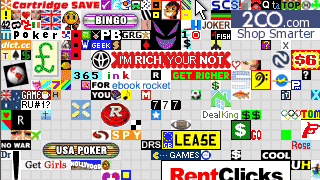 Alex Tew, a 21 year old student from Wiltshire, England tried a unique experiment to raise money for his university education.
Alex Tew, a 21 year old student from Wiltshire, England tried a unique experiment to raise money for his university education.His thought processes went something like this: what if he set up a website called the Million Dollar Homepage which contained exactly one million pixels (the tiny dots that make up an image on a screen)? What if he then used that page as, in effect, an advertising noticeboard where advertisers could buy space at $1 per pixel?
The Million Dollar Homepage is broken up into 10,000 100-pixel squares; Tew sells the 100-pixel squares off for $100 each, or $1 per pixel. The idea was an instant success. In the first four weeks alone, Alex sold more than 300,000 pixels at $1 each. As on today, Tew's Million Dollar Homepage has sold 900,400 pixels and the buyers are still flooding in.
Here is a animated graphic displaying the Making of the MIllion Dollar Homepage.
.NET spoke with Alex Tew, the mastermind behind milliondollarhomepage.com. He explains how he became a wealthy man by selling some pixels and what he intends to do with all the money.
 Q: Why does the site seem to succeed? Why do companies buy pixels? And why did it happen so fast?
Q: Why does the site seem to succeed? Why do companies buy pixels? And why did it happen so fast?A: The site succeeds because I think people respect an original idea. Things that are unique and novel naturally get talked about, if they’re interesting. My crazy idea to make money seems to have caught people’s imagination. So it means thousands of people are logging on every day.
Q: Who bought the first pixels and why?
A: A friend of a friend who runs an online music site bought 400 - I basically explained that the site could become really popular if it catches on and these 400 dollars could be the best marketing investment they ever make. They decided it was worth a punt and went for it. I’m sure if the site had flopped they would have wanted their money back, but obviously things took off. I understand their site received over 20,000 unique visitors directly from their ad on my home page within the first three weeks. A pretty good return I think.
Q: What will you spend the money on?
A: The first thing I bought was some new socks! You can see them on my blog. Then I was able to pay for my first year’s university tuition fees and living costs, which was cool, because it took the pressure off my parents. Apart from some normal stuff like clothes and CDs, I've not bought anything extravagant really. With the rest of the money I plan to invest in some of the new ideas I've got.
Read full interview with the brain behind the Million Dollar Homepage